The Misinformation of Diets and Labels
All That Antithetical Advice
Dietary suggestions can feel so long-winded and personally exhausting that they might as well be called Terms & Conditions. The healthiest people eat the Mediterranean diet, right? But someone told you heating olive oil in the frying pan releases carcinogenic compounds (debunked https://authoritynutrition.com/is-olive-oil-good-for-cooking/). Bread is served up by the Grim Reaper himself and dairy is glorified cow puss, but go to Spain or France and all you’ll eat is ciabatta and cheese. Fat is the last thing our culture wants us to be, but Fat-Free labels are food-industry-speak for Nutrient-Free. Like, “We removed all the good fats and replaced them with chemicals. 0 Trans Fat, you’re welcome.”
Then there are the low-carb, keto diets, advertised as if they can whip you right into shape themselves, and yet, they leave little room for your recommended servings of fruits and root vegetables. Green juices and smoothies deliver us an abundance of nutrients we might otherwise miss, but they also significantly spike our sugar intake. Is anything healthy anymore?
Label Lovers
Beyond the Nutritional Labels lies an entirely different discussion, one of ethics and the environment. Livestock are sickened by the grains they are unnaturally force-fed and yet, reportedly, grass-fed animals take a greater negative toll on the environment. A vegan diet rescues the planet and the animals, but what of the unethical labor conditions that brought you your fruit salad? What of the farmer, forced into mono-cropping corn, who can’t even feed his family? Is it preferable to eat a certified sustainable and humanely raised chicken or fish than a thawed out, inorganic apple? These are the dilemmas we face; how do we lighten our footprints?
If you’re living in the Big Apple, you’ve probably been exposed to every kind of answer to the above questions. You’re contacts undoubtedly include the omnivore, paleo, vegetarian, lacto-ovo, pescatarian, vegan, raw vegan, freegan, locavore, flexitarian - perhaps even the newly coined regenetarian (by Dr. Bronner). These distinctions, paired with the sheer volume of misinformation churned out by the food industry, are enough to make you hoist your white flag and surrender to a lifetime of ill-advised eating habits.
We at FRESH Med are the first to admit the combination of pressures is stressful. And by now, you know us enough to know that we prescribe both Food and Relaxation As Medicine - So dietary stress simply won’t do! Let’s talk about our co-founders to get a grip.
The FRESH Approach to Fare Wellness
Dr. Rob himself follows what the label-loving linguist might call a flexitarian diet, but he likes to say he’s Virtually Vegan, and when he’s virtually not, he’s a Conscious Carnivore. Environmental reasons aside for the moment, the Doc deduces from scouring the depths of today’s cutting edge science that a plant-based diet is the favored option for the health of your Average Jane Doe. However, his dietary prescriptions leave coveted wiggle room - a welcome relief from the typically strict categories.
It was a couple of weeks ago now that we stood in line at a local juice joint, discussing the concepts of veganism and idyllic food choices. Like always, Dr. Graham tactfully boiled it down, and what remained at the bottom of this convoluted melting pot was the simple fact of balance. Whether it’s raw or cooked, kale is better for you than a burger. But if you’re conscious about the source, it’s perfectly acceptable to delight in the occasional burger. Eat more vegetables, but don’t feel ashamed if you’re “only” Virtually Vegan.
The objective of our human minds is happiness; the objective of our human bodies is wellness. And as we know from our previous blog, these two goals go together like organic peas in a pod, since the gut contains a “second brain.” But as Julie witnesses in her experience as a Certified Health Coach, one brain can get in the way of the other. When food is a sinkhole into stress, our digestive systems cannot function as fountains of health. It’s something she sees in many of her patients, when perfect becomes the enemy of the good.
Julie, too, recommends a plant-based lifestyle, with special emphasis on the word “based,” as opposed to “only.” Because each person has unique nutritional needs, one size does not fit all, and comparison becomes futile. Regardless of your longitude on the expansive dietary spectrum, if where you are represents your best health, then that spot is where you ought to be. And you ought to be able to stand there free of shame.
So from now on, remember FRESH Med each time you eat: your prescription calls for a visit to your farmacist for extra veggies, with a healthy portion of self-awareness, self-forgiveness and mindfulness.



